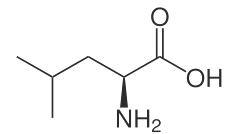Leucine is one of the three amino acids we know under the name BCAA’s. Along with isoleucine and valine, this amino acid is often used by athletes to improve muscle recovery. L-leucine, L-isoleucine and L-valine are among the essential amino acids called Branched Chain Amino Acids (i.e. branched amino acids). The human body itself does not produce essential amino acids. Therefore, it is important to remove these amino acids from high protein foods or BCAA supplements. But what exactly does this amino acid play in the physiological processes in our bodies? Is leucine an important amino acid for muscle mass building?
What is leucine?

As mentioned, leucine is one of the essential amino acids and is part of the three BCAAs. Other essential amino acids are; isoleucine, valine, lycine, methionine, phenylalanine, threonine and tryptophan. Also, cysteine and tyrosine are essential for children and arginine and histidine fall under the semi-essential amino acids. Because the body itself does not produce these amino acids, it is important to get enough protein from your diet.
Leucine plays an important role in protein synthesis, i.e. converting proteins into muscles. This substance gives the starting signal for protein synthesis and contributes to new muscle tissue production (= muscle mass build-up). The chemical formula for leucine is C6H13NO2.
What products contain leucine?
To get enough leucine, you must get enough protein from your diet. It is also important to choose different protein sources, giving you a diverse amino acid profile. Think of a combination of animal and vegetable proteins, such as cereals and dairy or rice with fish or meat. What’s leucine in? The foods below are rich in this amino acid.
- Beef
- Whole grain rice
- Beans
- Nuts
- Salmon
- Egg yolk
- Goat’s milk
- Shrimp
- Lentils
L-leucine and muscle mass
But what is the effect of leucine on our muscle mass? This amino acid plays a big role in protein synthesis. This is building proteins in our muscles. Muscle protein synthesis, also called protein biosynthesis, is the process in our body where cells make new proteins. Protein synthesis is therefore important for muscle growth after a workout. During your strength training, you do small damage in the muscle tissue. These are restored through protein synthesis, with the result that you become stronger and more muscular (this is called super-compensation).
To ensure optimal functioning, leucine needs the other two BCAA’s, namely isoleucine and valine. Partly for this, it is smart to follow a varied diet with different sources of protein. Also, BCAA supplements are often provided with these three amino acids in a specific ratio.
Combine leucine with carbohydrates
Research shows that it is best to combine leucine with carbohydrates in the form of glucose. This strengthens the absorption of leucine into the body. Carbohydrates from animal foods increase the insulin response, and this stimulates muscle protein synthesis. Indirectly, this has a positive effect on the recovery of your muscles and the building of more muscle mass.
Leucine supplements for muscle building?
L-leucine is, therefore, important for the recovery of muscle mass and stimulates protein synthesis. So does it make sense to take a leucine supplement when you’re doing strength training or endurance sports? Many athletes use supplements to improve their sports performance. Various studies have shown that leucine supplements increase protein synthesis.
As in this study by Maastricht University in which taking it during meals after a workout causes an increased muscle protein build-up of as much as 16%, however, it should be said that these effects have been measured in people with low or medium protein intake in their diet. It is unknown whether leucine supplementation has as much effect when you have a high protein intake (2 to 2.4 grams of protein per kilogram of body weight).
However, other studies have also been published showing that leucine as a supplement is not that valuable. The explanation behind this? Although this amino acid does signal higher protein synthesis, it is still important to have enough complete proteins available in the body. The signal does not directly lead to more muscle growth.
This research published in Applied Physiology, Nutrition and Metabolism shows that a protein shake after exercise makes just as much sense. A whey shake of 30 grams of powder contains approximately 3.5 grams of leucine, which is enough to get the protein synthesis going and stimulate recovery.
BCAA supplement or eat more protein?
More is not always better; therefore, choose the right dosage of leucine if you want to use a BCAA supplement. Research shows that excessive intake can lead to increased levels of ammonia in the blood.
The American Journal of Clinical Nutrition establishes a safe upper limit of 500 mg per kilogram of weight. A recommended daily dosage for leucine is about 3 – 6 grams. Many BCAA supplements contain leucine, isoleucine and valine in a ratio of 2:1:1, with the former being the highest dosed. So if you take 10 grams of BCAAs per day (before, during or after your training), you will get 5 grams of leucine and 2.5 grams of isoleucine and valine.
My advice
My advice? Always make sure you have a good diet with enough protein first. The added value of amino acid supplements with a high protein intake has not been concretely demonstrated. After all, you get enough amino acids from your diet. However, are you dry-training and are you in a calorie deficit? Then it may be useful to add leucine as a supplement to protect your muscles.


